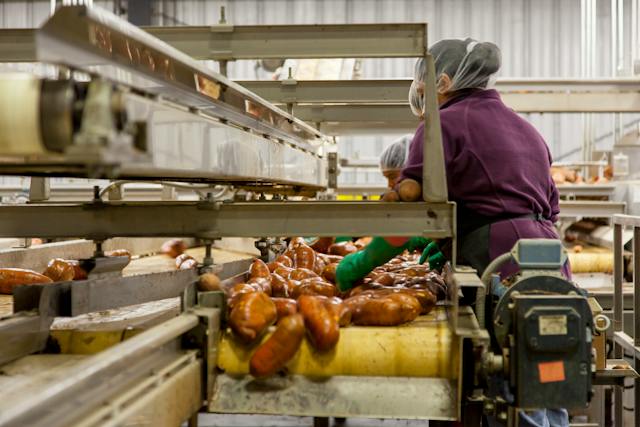Do you often find yourself intrigued by the world of packaged foods, wondering if it could be a viable career path for you? In today’s world, the demand for convenient, ready-to-eat meals and snacks is at an all-time high, making the packaged foods industry a lucrative and promising field to pursue. However, before you set out on this path, it’s crucial to weigh the challenges and opportunities that come with a career in culinary commerce.
Throughout this blog post, we’ll explore the intricacies of the packaged foods industry, from the potential for innovation and creativity to the regulatory hurdles and health concerns that must be navigated. By the end, you’ll have a your answer for this question: Is Packaged Foods a Good Career Path? So, happy reading!
Key Takeaways:
Growth in the Industry
The packaged foods industry is experiencing significant growth, making it a potentially lucrative career path for those interested in culinary commerce.
Job Opportunities
There are diverse job opportunities available in the packaged foods sector, including roles in product development, marketing, and quality control.
Required Skills
Pursuing a career in packaged foods requires a blend of culinary expertise, business acumen, and a strong grasp of food science and safety regulations.
Market Trends
Understanding consumer preferences and market trends is crucial for success in the packaged foods industry, as it is constantly evolving to meet changing demands.
Career Development
With the right skills and experience, individuals can advance to leadership positions in packaged foods companies and have the opportunity to contribute to shaping the future of the industry.
Essentials of Packaged Foods

Some of the key essentials of packaged foods include the use of preservatives, packaging materials, nutrition labeling, and food safety standards. Packaged foods are products that have been processed and then put into packaging for distribution and sale.
Key Elements of Packaged Foods
When it comes to the key elements of packaged foods, there are several components that play a crucial role. Preservatives are added to packaged foods to extend their shelf life and prevent spoilage. Packaging materials are carefully chosen to ensure the preservation of the product and to provide information to consumers. Nutrition labeling is also an essential element, as it provides consumers with important information about the contents of the product.
The Role of Packaging in Food Manufacturing
The role of packaging in food manufacturing is vital for ensuring the safety and quality of the product. Packaging serves to protect the food from external factors such as contamination, tampering, and damage during transportation and storage.
It also plays a significant role in branding and marketing by providing a platform for product information, branding, and promotional messages.
Culinary Commerce: Defining the Landscape

To truly understand the landscape of culinary commerce, you must first grasp the diverse career opportunities available within the industry. Whether you are a seasoned professional or just starting out, it is important to explore the various paths that can lead to a successful and fulfilling career. One such path to consider is the packaged foods industry. If you are wondering whether this could be a good career choice for you, you can check out this short guide: Is packaged foods a good career path? A short guide.
Packaged Foods in the World of Culinary Commerce
When it comes to the world of culinary commerce, the packaged foods industry plays a significant role in meeting the demands of consumers looking for convenience, quality, and flavor. With an ever-growing market, the potential for growth and success in this sector is substantial. As a professional in the packaged foods industry, you have the opportunity to develop and distribute products that cater to a wide range of dietary needs and taste preferences.
Whether you are working in product development, marketing, or distribution, your influence on the industry can be profound. The impact of your work can extend to homes and businesses around the world, providing sustenance and enjoyment to countless individuals.
Post-Modern Culinary Trends and Packaged Foods
In the age of post-modern culinary trends, the role of packaged foods continues to evolve and adapt to the changing demands of consumers. With an increasing focus on health, sustainability, and convenience, the packaged foods industry has the opportunity to innovate and meet the needs of the modern consumer. This presents a significant opportunity for professionals in the industry to stay ahead of the curve, capitalize on emerging trends, and contribute to the development of products that align with contemporary lifestyles.
However, it is important to remain vigilant in addressing concerns related to the quality of ingredients, sustainability practices, and nutritional value. Your role in this industry can have a profound impact on the choices consumers make, and it is crucial to consider the implications of your work on the well-being of individuals and the environment.
Prospects in the Packaged Foods Industry

Lastly, let’s consider the prospects in the packaged foods industry. As the demand for convenient, ready-to-eat meals continues to grow, the industry offers a wealth of opportunities for those looking to build a career in this sector. With advancements in technology and changing consumer preferences, the packaged foods industry is constantly evolving, presenting a range of career prospects for individuals with the right skills and expertise.
Career Overview in the Packaged Food Industry
When it comes to building a career in the packaged foods industry, there are a variety of roles to consider. From food scientists and product developers to supply chain managers and marketing professionals, there is a diverse range of career paths available to you. Whether you are interested in the technical aspects of food production or prefer to work on the business side of the industry, there are opportunities to suit your skills and interests.
The Rising Demand for Specialized Skills
One of the key factors driving the growth of the packaged foods industry is the increasing demand for specialized skills. As consumers become more health-conscious and environmentally aware, there is a growing need for professionals with expertise in areas such as food safety, sustainability, and nutrition. If you have a background in science, engineering, or nutrition, your skills are highly sought after in the industry.
Additionally, with the rise of e-commerce and direct-to-consumer channels, there is a growing need for individuals with digital marketing and e-commerce expertise to drive sales and brand growth.
Skillset Requirements and Responsibilities

However, before you decide to pursue a career in the packaged foods industry, it is essential to understand the skill set requirements and responsibilities associated with this field. This will help you assess whether you have the necessary qualifications and abilities to thrive in this sector.
Key Skills Required for a Career in Packaged Foods
When considering a career in packaged foods, it is crucial to possess a range of key skills. Firstly, a strong understanding of food science and nutrition is essential, as you will be responsible for developing and creating food products that meet regulatory standards and consumer demands. Additionally, proficiency in food safety and quality control procedures is vital to ensure that products meet rigorous industry standards and are safe for consumption.
Furthermore, having strong communication and teamwork skills is important, as you will need to collaborate with various departments such as research and development, marketing, and production to bring new products to market successfully.
Finally, having a business acumen and understanding of market trends is beneficial for making informed decisions and creating products that resonate with consumers.
General Responsibilities within the Packaged Foods Sector
In the packaged foods sector, your responsibilities may vary depending on your role and the company you work for. However, some general responsibilities include conducting research and development to create innovative and marketable food products, ensuring compliance with food safety regulations and quality standards, collaborating with cross-functional teams to bring products to market, and monitoring market trends to identify opportunities for new product development.
Moreover, you may also be responsible for managing production processes, overseeing product testing, and developing marketing strategies to promote packaged food products. It is important to note that attention to detail and the ability to work efficiently under pressure are critical for success in this dynamic and fast-paced industry.
Benefits and Challenges of a Career in Packaged Foods
After considering a career in the packaged foods industry, it is important to weigh the benefits and challenges that come with pursuing this path. Understanding the advantages and potential hurdles can help you make an informed decision about whether a career in packaged foods is the right choice for you.
Advantages of Working in the Packaged Foods Industry
When it comes to a career in the packaged foods industry, there are several advantages to consider. One of the key benefits is the stability and growth potential of the industry. The demand for packaged foods continues to remain strong, making it a reliable career choice. Additionally, the industry offers a wide range of career opportunities, from food production and packaging to marketing and distribution. This means that you have the opportunity to explore diverse roles and find the perfect fit for your skills and interests.
Potential Hurdles and How to Overcome Them
While a career in the packaged foods industry has many advantages, it also comes with potential hurdles. One of the main challenges is the competitive nature of the industry. With numerous companies vying for consumer attention, standing out and advancing your career can be challenging. Additionally, there may be concerns about the health implications of working in an industry that produces processed foods. However, by staying informed about industry trends and advancements, and continuously updating your skills, you can overcome these challenges and make a positive impact in the industry.
Case Studies of Successful Careers in Packaged Foods
Lastly, let’s take a look at some real-life case studies of individuals who have built successful careers in the packaged foods industry. These success stories can provide valuable insights and inspiration for anyone considering a career in this field.
Case Study 1
- John Smith: John started his career in the packaged foods industry as a junior marketing executive in a small food company. Through hard work and dedication, he quickly rose through the ranks and is now the CEO of a multinational packaged foods corporation, overseeing a global workforce and driving significant revenue growth.
Case Study 2
- Jane Doe – Jane’s passion for food led her to pursue a career in product development within the packaged foods industry. She now holds several patents for innovative food products and has been recognized as a trailblazer in the industry, with her products flying off the shelves in major grocery chains.
Key Success Stories in the Packaged Foods Industry
When it comes to success in the packaged foods industry, the key lies in innovation, determination, and a deep understanding of consumer preferences. Individuals like John Smith and Jane Doe have shown that with the right skills and mindset, you can carve out a successful career in this competitive field. Their experiences can serve as great inspiration for anyone aspiring to make their mark in the industry. With hard work and a passion for food, you can achieve remarkable success in the packaged foods industry.
Lessons Learned: Insights from industry veterans
As you consider a career in the packaged foods industry, it’s important to learn from those who have come before you. Industry veterans emphasize the importance of staying abreast of changing consumer preferences, understanding market trends, and embracing innovation. Successful individuals in the industry have highlighted the necessity of adapting to the evolving landscape and taking calculated risks to bring new, exciting products to market.
Additionally, networking and building strong relationships within the industry can open doors to new opportunities and assist in career advancement. Keep in mind that perseverance and resilience are key traits that have led to success in the packaged foods industry. And you can also read these tips to know your career choice.
Conclusion – Is Packaged Foods a Good Career Path?
Presently, you have gained a comprehensive understanding of the packaged foods industry and the potential career paths it offers. Whether you are considering a career as a food product developer, packaging engineer, or marketing specialist, it is clear that the packaged foods industry is thriving and offers a wealth of opportunities for professionals like yourself. With the evolution of consumer preferences and the growing demand for innovative and sustainable food packaging solutions, this industry is primed for continued growth, making it a promising career path for you to pursue.
Ultimately, the decision to pursue a career in the packaged foods industry is a personal one, and it is important for you to carefully evaluate your interests, skills, and career goals. However, given the industry’s resilience and potential for innovation, pursuing a career in packaged foods could be a rewarding and fulfilling choice for you.
So, if you have a passion for culinary commerce and an interest in contributing to the evolution of the food industry, a career in packaged foods may be the perfect fit for you but if you are still fused and asking yourself that if food industry is right for me then you should check out this blog to choose the right path for your career.
People also asks – Is Packaged Foods a Good Career Path?
What is the career outlook for packaged foods in the culinary industry?
The packaged foods industry continues to experience steady growth, creating a promising career path for individuals seeking employment in this sector.
What are the typical job roles within the packaged foods industry?
Job roles in the packaged foods industry can vary from food production and quality control to marketing and sales. There are also opportunities in research and development, packaging design, and supply chain management.
What skills are essential for a career in packaged foods?
Strong communication skills, attention to detail, and a passion for food are essential for success in the packaged foods industry. Additionally, knowledge of food safety regulations and an understanding of consumer trends are valuable assets.
What are the potential challenges of working in the packaged foods industry?
Challenges in the packaged foods industry may include meeting strict production schedules, ensuring product consistency, and navigating regulatory requirements. Additionally, staying ahead of consumer preferences and trends can present a constant challenge.
What opportunities for advancement exist in the packaged foods industry?
Advancement opportunities in the packaged foods industry can include moving into management roles, taking on leadership positions in research and development, or transitioning into sales and marketing management. Additionally, there may be opportunities to specialize in niche areas such as organic or health-focused food products.

Author Bio
Brian Bertrand
Brian Bertrand is an experienced resume writer with over five years of expertise in catapulting clients to their dream jobs. Through collaborations with renowned freelance platforms and esteemed online resume service brands, he has carved a niche for himself by delivering personalized, top-notch resumes that encapsulate the very essence of each client’s accomplishments, skills, and character. Diligent in his approach, Brian’s innovative flair and unwavering commitment to his craft make him a trusted partner in the pursuit of professional success. With an insistent curiosity for diverse industries and career trajectories, Brian strives to ensure that each resume he creates stands out from the competition. Whether you’re an aspiring graduate, a career switcher, or a seasoned pro, Brian possesses the expertise to craft a resume that truly reflects your unparalleled value and potential.

